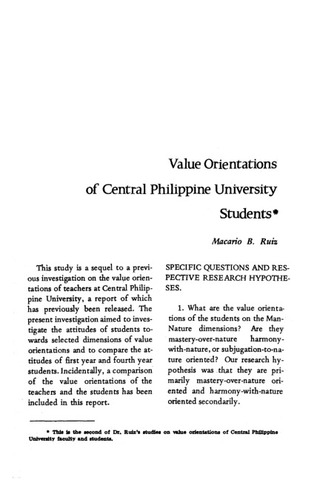Value orientations of Central Philippine University students
| dc.contributor.author | Ruiz, Macario B. | |
| dc.date.accessioned | 2022-07-06T00:14:09Z | |
| dc.date.available | 2022-07-06T00:14:09Z | |
| dc.date.issued | 1974 | |
| dc.identifier.citation | Ruiz, M. B. (1974). Value orientations of Central Philippine University students. Southeast Asia Journal, 7(2), 1-21. | en_US |
| dc.identifier.issn | 0038-3600 | |
| dc.identifier.uri | https://hdl.handle.net/20.500.12852/2135 | |
| dc.description | Journal article This is the second of Dr. Ruiz’s studies on value orientations of Central Philippine University faculty and students | en_US |
| dc.description.abstract | This study is a sequel to a previous investigation on the value orientations of teachers at Central Philippine University, a report of which has previously been released. The present investigation aimed to investigate the attitudes of students towards selected dimensions of value orientations and to compare the attitudes of first year and fourth year students. Incidentally, a comparison of the value orientations of the teachers and the students has been included in this report. 1. What are the value orientations of the students on the Man-Nature dimensions? Are they mastery-over-nature harmony -with-nature, or subjugation-to-nature oriented? Our research hypothesis was that they are primarily mastery-over-nature oriented and harmony-with-nature oriented secondarily. 2. What are the orientations of the students on the Time dimension? Are they past, present, or future oriented? We hypothesized that they are primarily present oriented and future oriented secondarily. 3. What are the orientations of the students on the Relational dimension? Are they individualism, collaterality, or lineality oriented? Our research hypothesis was that, as a group, they are individualism oriented primarily and collaterality oriented secondarily. 4. What are the value orientations of the students on the Activity dimension? Are they “doing” (achievement), being-in-becoming, or being oriented? The research hypothesis was that primarily they are being-in-becoming oriented primarily and “doing” (achievement) oriented secondarily. These research hypotheses were based on two primary considerations: (1) The subjects in this study are all college students, who presumably have been reared into the more modernistic attitudes, such as mastery over nature, preferring things of the present as contrasted with things of the future, institutionalized into the cultural pattern of self-centeredness of people in most cultures, including those of developing countries; (2) we have been influenced, fortunately or unfortunately, by the findings in the study on the value orientations of the faculty members of this University. | en_US |
| dc.language.iso | en | en_US |
| dc.publisher | Central Philippine University | en_US |
| dc.subject.lcsh | Values | en_US |
| dc.subject.lcsh | Social values | en_US |
| dc.subject.lcsh | Central Philippine University--Students | en_US |
| dc.subject.lcsh | College students | en_US |
| dc.subject.lcsh | College students--Attitudes | en_US |
| dc.title | Value orientations of Central Philippine University students | en_US |
| dc.type | Article | en_US |
| dcterms.accessRights | Publicly accessible | en_US |
| dc.citation.firstpage | 1 | en_US |
| dc.citation.lastpage | 21 | en_US |
| dc.citation.journaltitle | Southeast Asia Journal | en_US |
| dc.citation.volume | 7 | en_US |
| dc.citation.issue | 2 | en_US |
| local.relation.associatedcontent | https://repository.cpu.edu.ph/handle/20.500.12852/2119 Part 1 of the study | en_US |
이 항목의 파일
This item appears in the following Collection(s)
-
Southeast Asia Journal [188]


